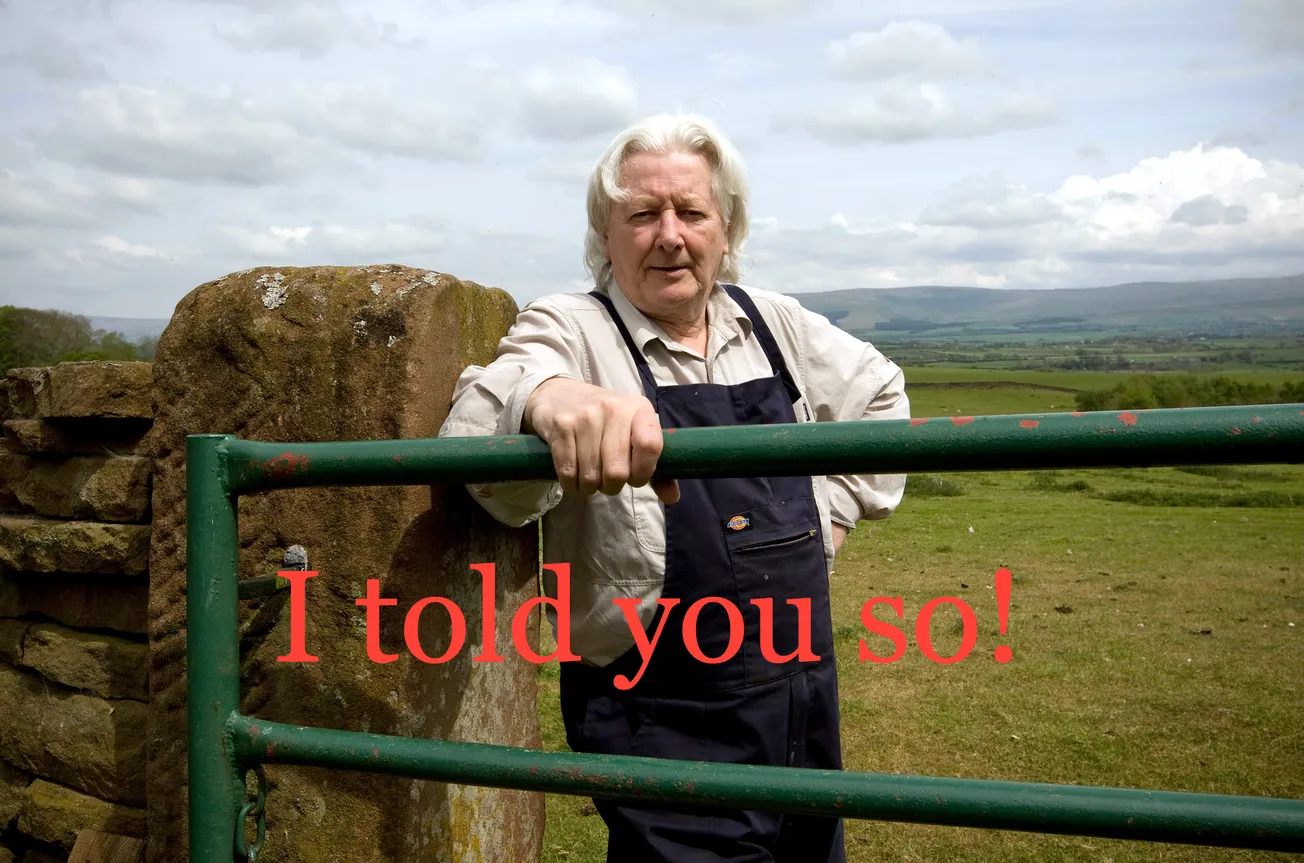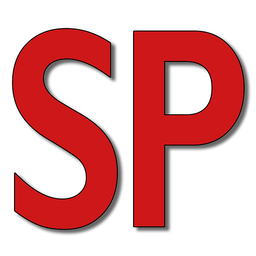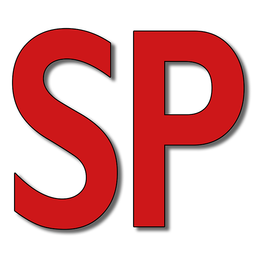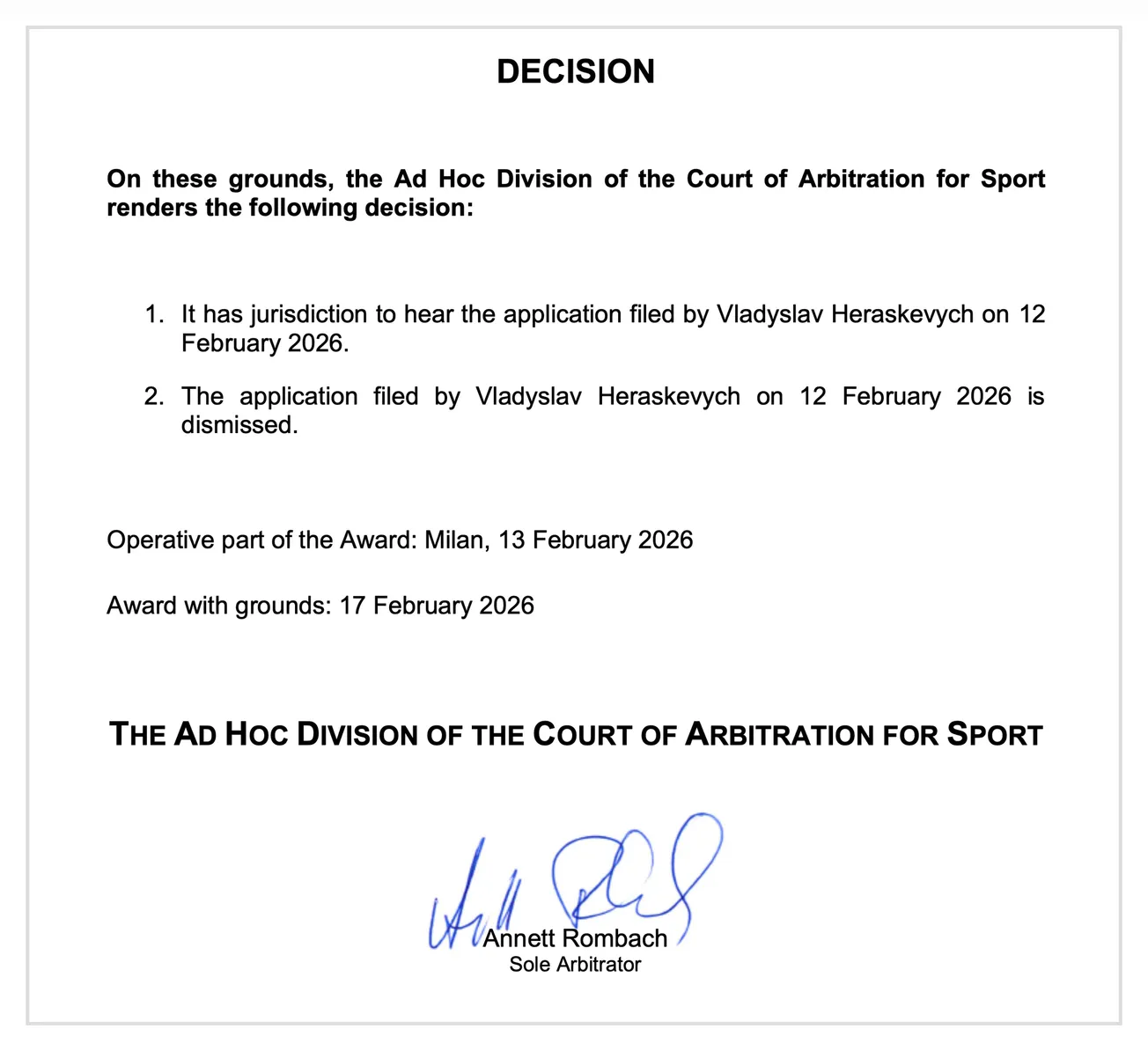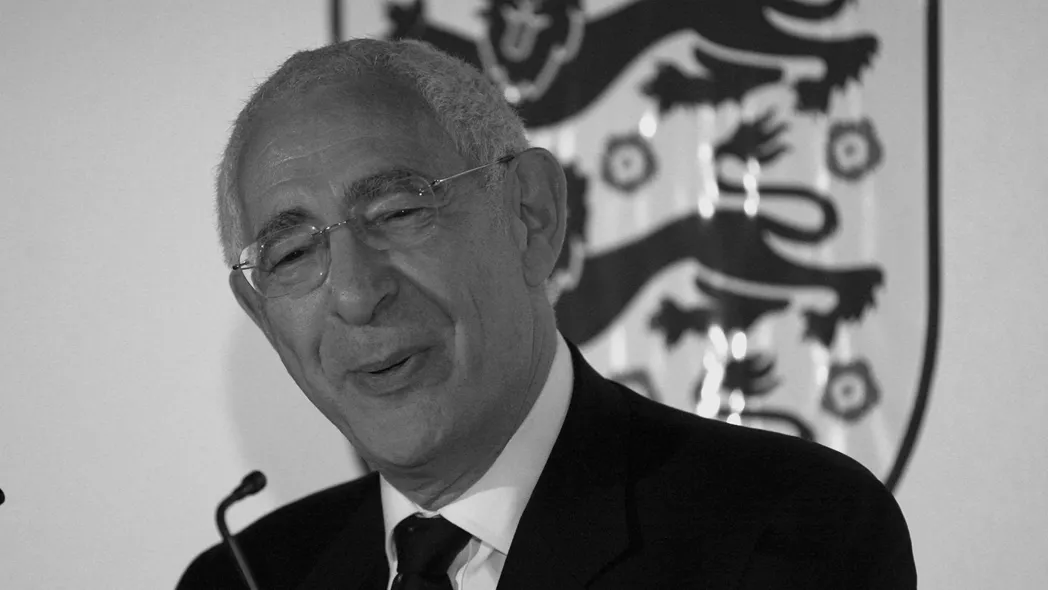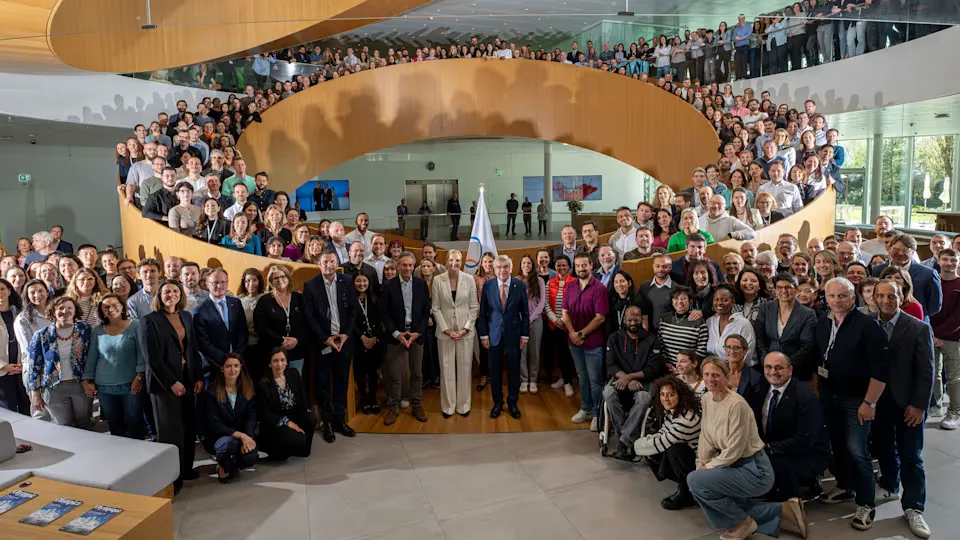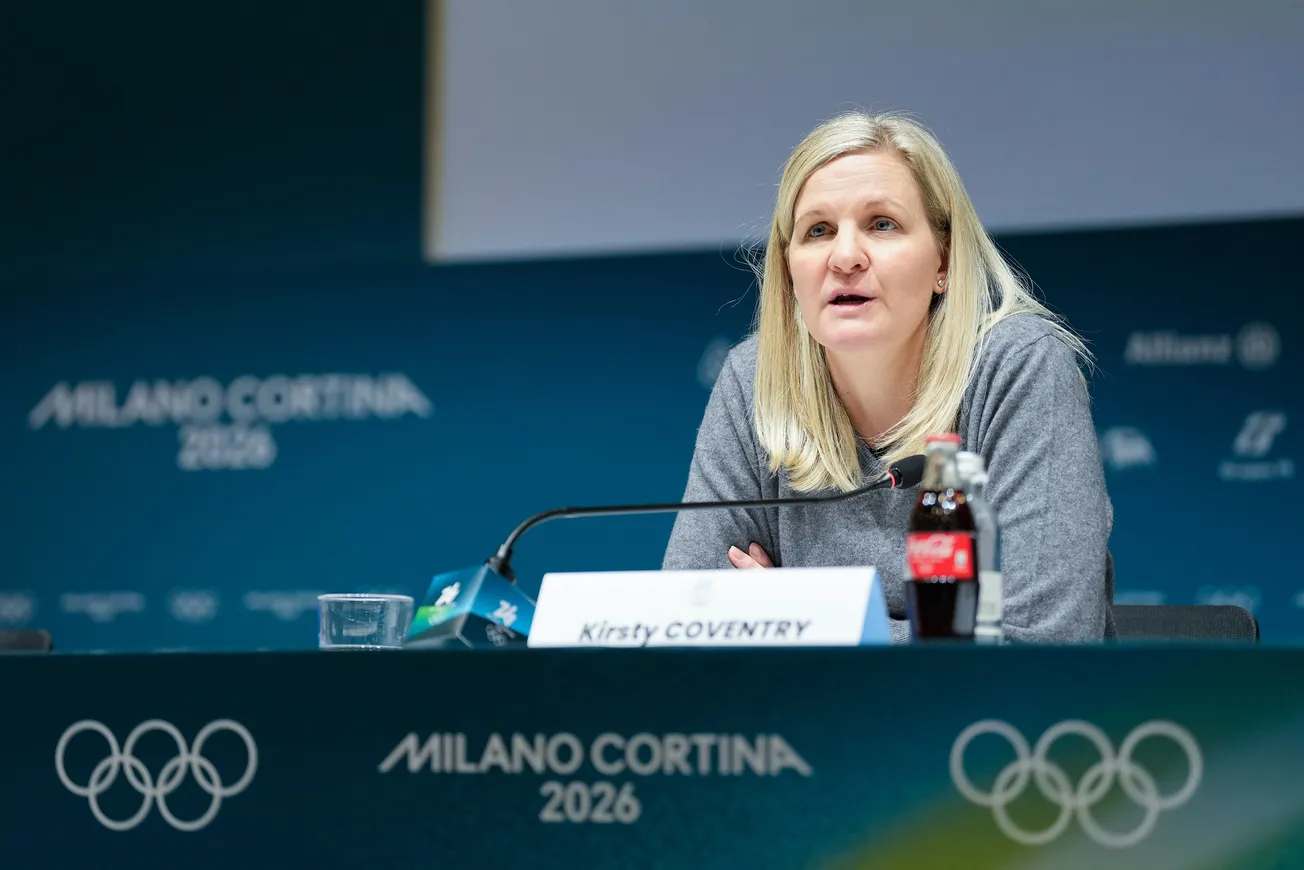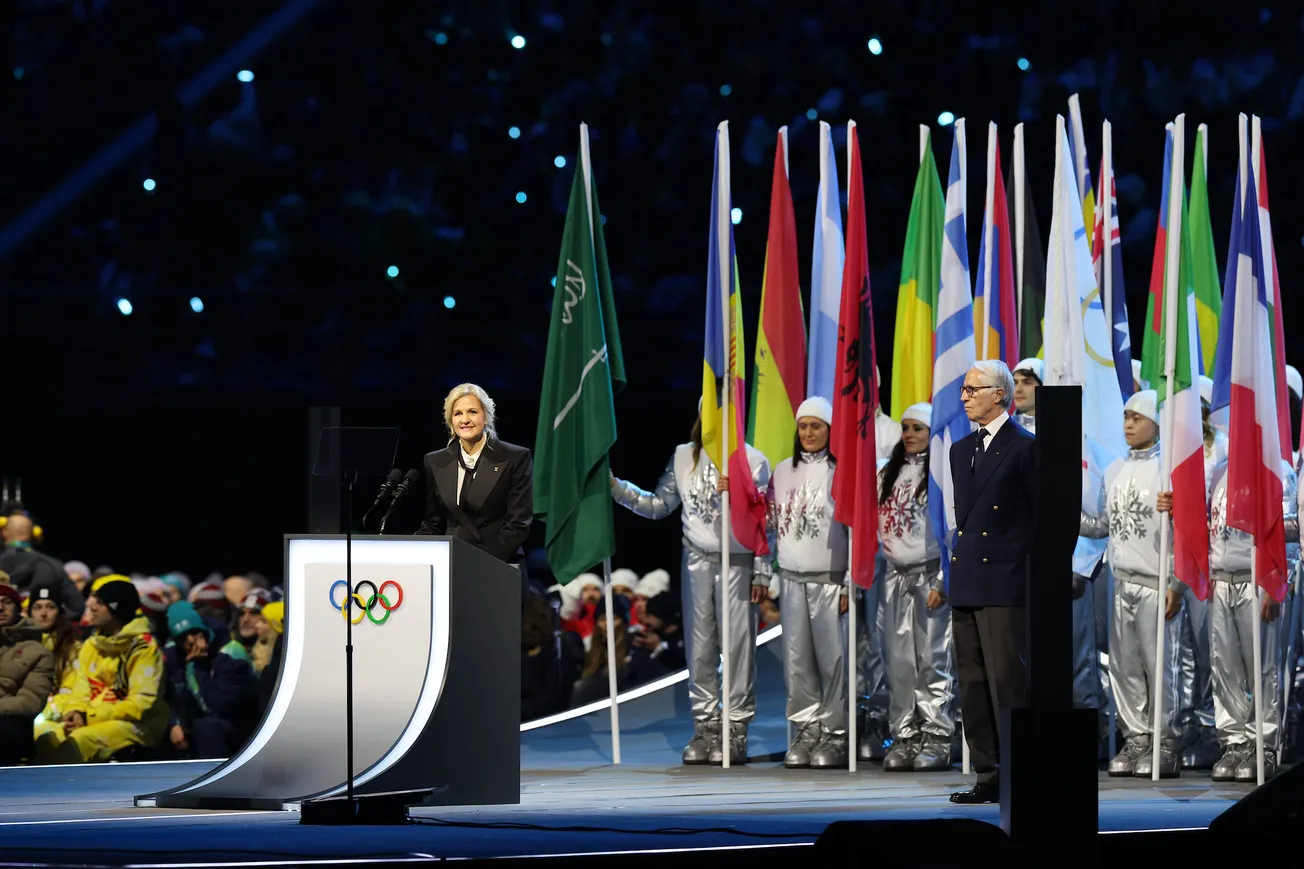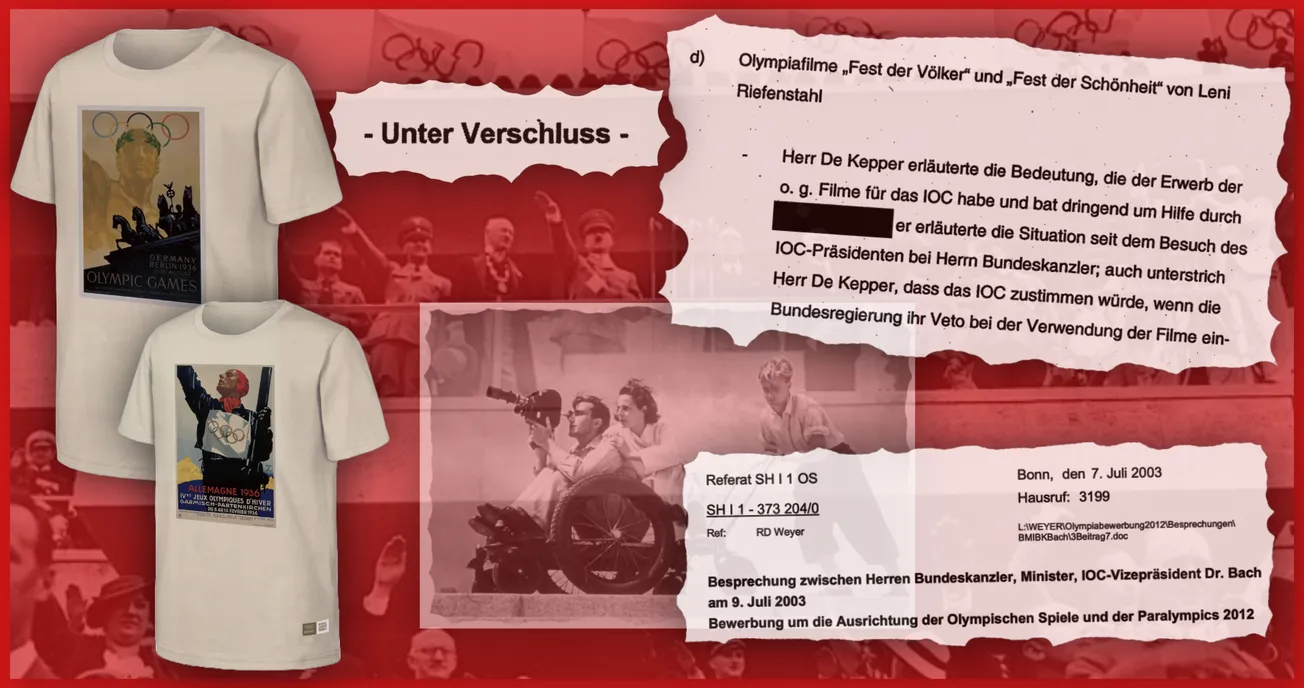“Much of this may have never come to light were it not for the tenacious and dedicated research and reporting over the decades of investigative journalists. Reading this simple Jennings article that August day ended up altering the next seven years of my life in ways I could never have imagined.”
Steven Berryman, Special Agent with the IRS
A hand went up. An eager young journalist in the audience had a question for the famous investigative journalist, Mr Andrew Jennings. He was in his pomp. A shock of white hair, braces, and slightly dishevelled. The centre of attention.
“Mr Jennings. How do you define investigative journalism?”
Pause. Big smile.
“Identify the enemy.”
“And destroy them.”
It was very Andrew Jennings. Provocative. Designed to get a laugh. Delivered for maximum impact to convey an important point. The fish, as he was fond of saying, always rots from the head. Once he’d worked out who the bad guys were, he was relentless. The bad guys he investigated morally offended him. He had quite a reputation. A hellraiser both personally and professionally.
So in 2005 when Panorama’s deputy editor, Andy Bell, a good friend of Andrew’s who had worked with him in independent television, told me “Your job is to hold the choke chain,” he was only half joking.
I first met Andrew in the 1990s at a birthday celebration at a London restaurant. It wasn’t his birthday, but he made quite an impression. He spent most of the meal talking to Japanese TV on the pavement outside. They were interviewing him about his latest book on corruption in the International Olympic Committee.
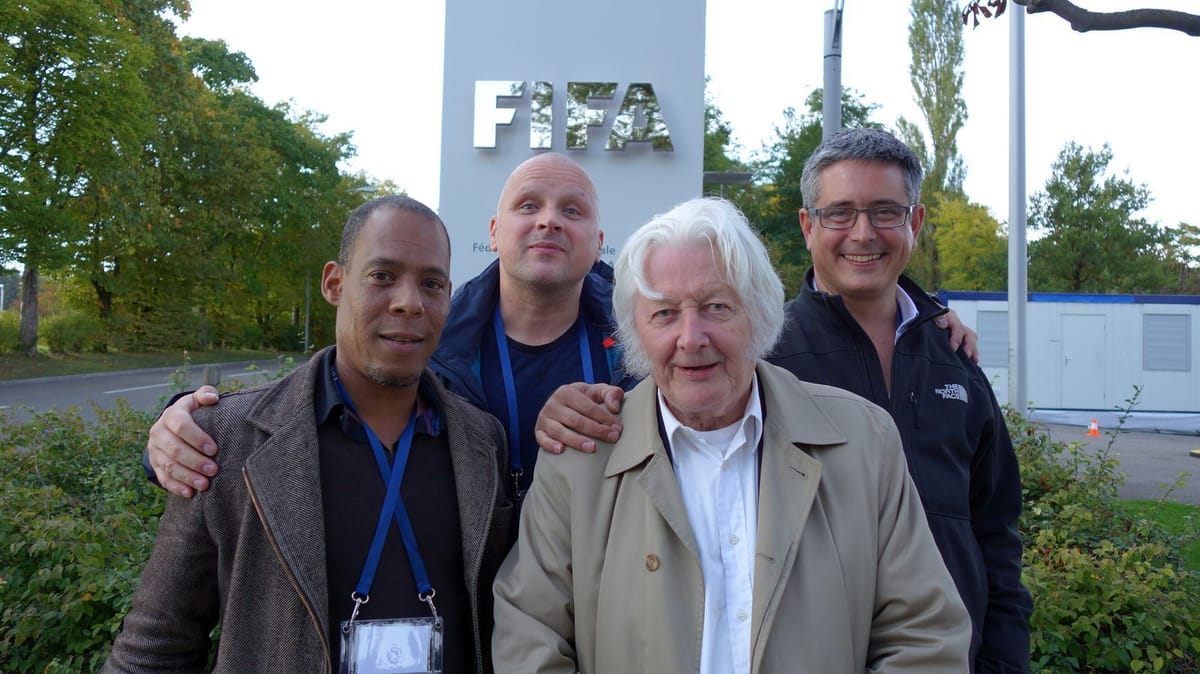
I already knew of his work. His earlier investigations into police corruption in the 1980s and his battles to get them broadcast. He had abandoned a successful career at the BBC over a decision not to screen one film. He went on to make it again at his new home at Granada television’s World in Action.
Now in 2005 he was back at the BBC. Andrew had come down from his home in the hills in the north of England in a suit to pitch a story to the broadcaster’s flagship current affairs programme, Panorama where I had recently been given a job.
His first book on FIFA was almost finished. The 2006 World Cup was being staged in Germany the next year. Would Panorama be interested in making a programme about evidence of corruption at FIFA?
The unfinished draft of his book I was given to read contained a long list of FIFA scandals to choose from. But the most damaging one for FIFA stood out: Andrew’s investigation into claims that FIFA’s former sports marketing company International Sports and Leisure, or ISL, had paid bribes to FIFA officials.
If true, FIFA was corrupt to the top.
Andrew’s evidence pointed to one recipient of ISL bribes as having been the President of FIFA until 1998, Brazilian João Havelange. It got worse, as Andrew would say.
His secret FIFA contacts told him that FIFA’s current President, Sepp Blatter, knew about the bribes. He’d authorised the return of one payment that had arrived at FIFA by mistake.
My job? To join Andrew’s investigation and find enough evidence to name the guilty men. They were all men.
The Beautiful Bung
But what about the film?
Andrew, to his great pride, had been banned by FIFA after asking questions about corruption. In FIFA’s world that made him toxic, not the crooks. There would be no cosy interviews with President Blatter at FIFA House in Zurich.
In fact almost nobody in FIFA’s orbit, officials or football stars, would talk to him, let alone give a TV interview for fear it might damage their careers or poison their lucrative relationships with FIFA. Even the few fantastic people who would talk, those cast out from FIFA’s golden circle, others horrified by the corruption they told us they’d witnessed, more often than not didn’t want to go public. These were the sources and whistleblowers who trusted Andrew and handed him the documents that were the bedrock of his journalism, and his ability to call out FIFA corruption.
But we decided to turn Andrew’s banishment from FIFA into an advantage. If they refused to let him into press conferences to ask questions, we’d find another way to confront FIFA’s leaders. What we in TV call a doorstep. If they refused to engage we would visually demonstrate FIFA’s refusal to be held to account.
Andrew was a past master of the doorstep. He relished them for the craft and choreography, and what they could achieve on television.
His 1980s doorstep of Superintendent Tony Lundy, a leading Scotland Yard detective who had been retired whilst under investigation over corruption allegations is legendary.
Andrew and his cameraman caught Lundy, retired as “permanently unfit for police work”, going for a healthy morning run. Running alongside, Andrew asked question after question to the non responsive detective.
The pictures said it all.
The confrontation ended when the cameraman could no longer keep up. He stopped. Held the shot. Andrew, still asking questions, ran on keeping pace with Tony Lundy into the distance down a country lane.
“I knew we’d got some important pictures that were far more important than any words we could ever write in that programme”, Andrew later said.
At a meeting in his BBC White City office, Panorama’s then editor Mike Robinson suggested a questioning approach.
“Like the US TV detective Columbo”, Mike said. A character who in every episode of the show ended quizzical interrogations of bad guys with a scratch of the head and another question.
“Oh there’s just one more thing sir”, he’d say.
Andrew loved the idea.
I decided to take it further. In my cupboard at home I had a carbon copy of Columbo’s trademark beige raincoat. When we landed at Zurich airport to start filming Andrew was wearing it. Now he even looked like the crumpled TV detective. Andrew ran away with the idea. And my raincoat.
Our first “meeting” with FIFA President Sepp Blatter was in the winter of 2005. Blatter and his 24 man Executive Committee were finishing their meeting in an outbuilding of FIFA’s old headquarters overlooking Lake Zurich.
Andrew and I had scoped it out. It was perfect.
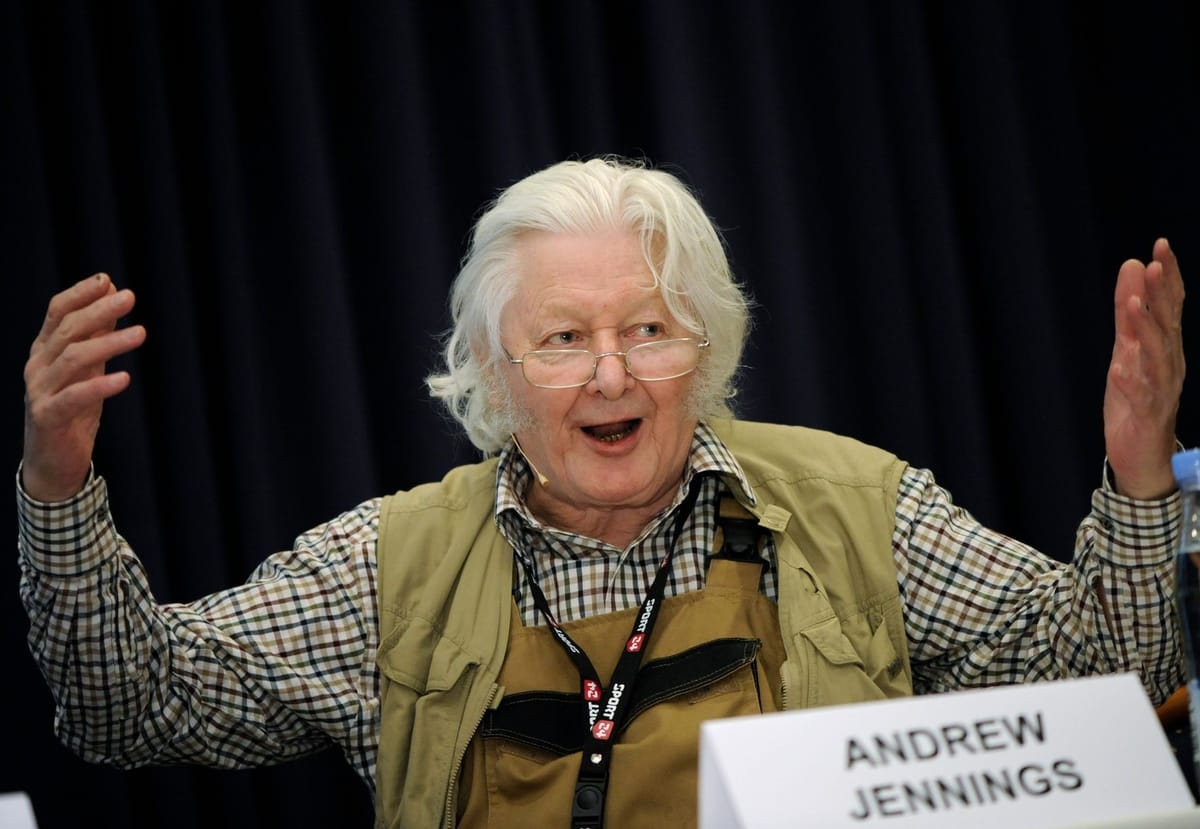
President Blatter’s meeting was in one building, the press conference in another. He’d have to walk from one to the other. Crucially, we found out, through a public park. No danger of trespassing and being told we had to leave. Unless President Blatter made a run for it, Andrew could have minutes to engage him in polite conversation.
We arrived as Blatter held his meeting inside with his fellow rulers of world football. Andrew, well known at FIFA House, waited discreetly in my raincoat, a flat cap drawn down over his face, half way along the avenue of trees we guessed Blatter would follow. He did.
“Please, can I come into your press conference?” Andrew asked politely as he drew alongside President Blatter. His staff helpfully made space to accommodate Andrew and the TV crew that had suddenly appeared.
Blatter had nowhere to go. Of course Andrew could come in to his press conference Blatter said. That was not going to happen, but Andrew was able to put his questions to the President of FIFA.
“Do you know which football officials took payments from the ISL marketing company? Andrew asked.
“I don’t answer these questions.” President Blatter responded. The matter was under investigation, he said.
And then the big one. Just one final question from the man in the raincoat.
“Will you tell me who took the one million franc bribe?” asked Andrew. “Can you tell me who it went to? Was it President Havelange?”
President Blatter didn’t answer and disappeared inside the FIFA building.
Months later we tried again.
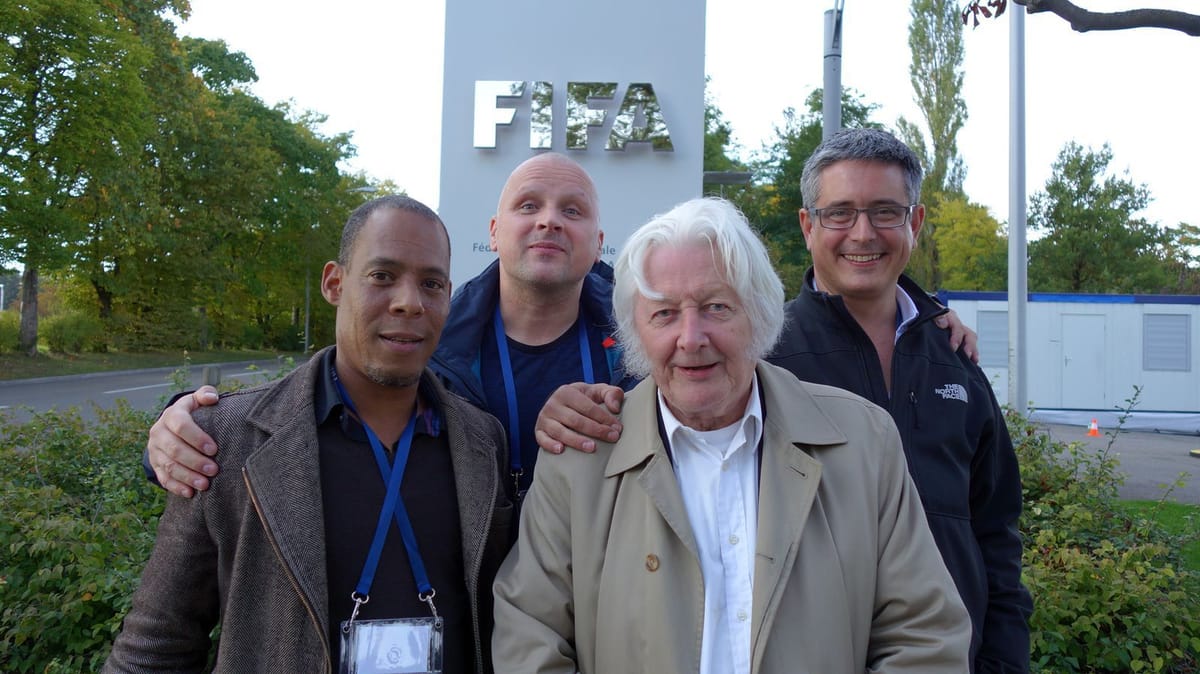
This time we filmed as Andrew sat in a car outside FIFA House, headphones on his head and linked by radio mic to Panorama reporter Andy Davies who was inside FIFA’s packed press conference. FIFA clearly realised something was afoot. President Blatter walked out before we could ask any questions and when we did ask Andrew’s questions, they caused consternation. FIFA’s head of communications threatened to call security and have Andy Davies and our cameraman thrown out.
Outside it was Andrew Jennings’, not FIFA’s press conference, that was the focus of attention. TV crews and members of the world’s press wanted to talk to him. A Swiss newspaper would report the next day on what they called a “riot at FIFA House”.
Outside the UK, I had discovered, Andrew was worthy of news himself.
It was the same in Trinidad. Hours after arriving in the home of notoriously corrupt FIFA Executive Committee member Jack Warner, journalists arrived to persuade Andrew to go on a local morning TV show to talk about FIFA and Jack Warner. He agreed.
For the rest of our trip Andrew was hailed by passers-by with cheerful greetings and less than polite references to Warner. And not a little laughter. Andrew was good at making you laugh.
The laughter in Trinidad increased after the TV6 TV channel filmed us doorstepping Jack Warner over allegations about his profiteering from World Cup ticketing. We’d been tipped off about his arrival at the airport with Trinidad and Tobago’s World Cup team, the Soca Warriors.
To the enjoyment of at least some of the team (Andrew got a call from one afterwards) Andrew was there to say hello. Jack Warner pushed Andrew in the chest, making him stumble backwards, refusing to answer any questions. It ended with Warner hiding on the team’s bus attempting to ignore Andrew, who had to jump up to knock on the window in an attempt to gain
FIFA’s vice president’s attention.
“Chasing the bad men”
Days later we doorstepped Jack Warner again. He hadn’t answered any of our questions about his dodgy football deals. This time no answers again, but he did put out a press release. It was ridiculous. Headed “Operation: Get Jack Warner” it claimed we were part of a “conspiracy” against Mr Warner with Trinidad’s government and a friend and collaborator of Andrew’s in Trinidad, journalist Lasana Liburd.
Jack Warner’s behaviour guaranteed himself a prominent place in our film and his dodgy deals would continue to buy him a place in all our FIFA films.
The Panorama film, The Beautiful Bung, was broadcast in May 2006. We identified former FIFA President João Havelange as the recipient of a huge bribe from ISL. President Blatter had known about it, and ISL’s bribery of other FIFA officials. The matter was under investigation by the Swiss authorities. At Panorama, as it should be, it’s all down to the strength of the evidence. Andrew was delighted by one reaction to a first cut of the film. “Well. They’re clearly at it.” Andrew and I could not have agreed more.
For Andrew and me, The Beautiful Bung was the beginning of a partnership lasting more than a decade. The first of six Panorama films I worked on with him. Assistant producer on that film, I became his producer and director, his partner in his FIFA investigations for the BBC, and his friend. Working with Andrew wasn’t all filming him confronting the bad guys. Most of it is just hard work, as Andrew would say.
At times we almost literally lived with each other. Sometimes at my flat in London. Other times staying with Andrew and his wonderful family in their home in Cumbria overlooking the Eden Valley. On the road he would write post cards to his young children.
“I’m chasing the bad men,” he’d tell them.
Andrew loved his job, or “the work” as he called it. And I loved working with him. It was hard, but never dull and a lot of fun. Not only because of the great raconteur he undoubtedly was.
His failure to deliver a carefully scripted piece to camera would inevitably result in an eruption of characteristically strong expletives, at both himself and whoever, often me, had written it. If it couldn’t be changed it got worse. It provoked a lot of affectionate laughter and mickey-taking in the edit later. He never objected to it.
It was an education for me, not just in relation to FIFA, but perhaps more importantly, about how to tell a good story. It was also a partnership. Endless hours of work, analysis, discussion, and plotting how to get the story, and how to tell it. We were fueled by a diet of coffee and cigarettes. In Switzerland, we’d spend hours plotting our next move over dinner in local restaurants. “Not another schnitzel!” Andrew would say. And as anyone who knows Andrew will appreciate, there would be at least a glass or two of wine.
We knocked on endless doors trying to get the people who knew FIFA’s darkest secrets to talk. More often than not we received a polite, sometimes not so polite, refusal. Many were compromised, or too fearful of FIFA’s power and influence to talk. But sometimes it worked. Neither Andrew nor I could quite believe it when one former ISL executive not only opened his door to us, but told us in detail how ISL had used a system of “alternative rights payments” to pay bribes to sporting officials. He even named names.
He had read one of Andrew’s books on the IOC. The book opened the door. Andrew signed it before we left. We walked quietly up the road to our car before daring to say anything about what we had just learned.
But mounting evidence of corruption at FIFA had little impact on FIFA.
“Nothing happens!”
“I don’t understand it”, said Panorama’s new editor Sandy Smith after the broadcast of another film. “We show they’re corrupt and nothing happens! What’s the point?”
This article was first published in the magazine in honour of Andrew Jennings.
Fifty-three authors from 17 countries contributed to this issue, including Joseph Blatter, Dick Pound, Sir David Triesman and some of the best FIFA investigators worldwide – who already investigated FIFA in the 1990s amid great resistance, when criticising FIFA was not yet fashionable but a tough battle. Without this research, the FIFA charges would never have been brought.
The magazine, a small piece of sporting history, is included in every subscription to SPORT & POLITICS and THE INQUISITOR to mark the anniversary of the FIFA charges.
| Table of contents | |
| Andrew Jennings | Some thoughts on our simple craft |
| Jens Weinreich | Let’s get on with it! |
| Vyv Simpson | How it all began |
| Richard W. Pound | “He did not hesitate to boldly go where no one else had ever gone” |
| Frank Brandsås | The Orange Skier |
| Albert Knechtel | “Sincere, courageous, conscientious” |
| Patrick Nally | How we will miss him |
| Mathew D. Rose | Rebel with a cause |
| John Hoberman | Collusion with the evil |
| Jan Jensen | Advantages of Christiana |
| Jay Coakley | The experience of hosting an investigative reporter |
| Alan Tomlinson & John Sugden | Hunger for documents |
| Thomas Kistner | The legend remains |
| Jens Sejer Andersen | The Incomparable |
| Sepp Blatter | „… I would be glad if Andrew Jennings was still here“ |
| Bob Munro | Uniquely rambunctious, uniquely resolute |
| Ezequiel Fernández Moores | The muckraker who always had hope |
| Pablo Vignone | Face to Face |
| Craig Lord | „Slayer of the Corrupt“ |
| Lars Jørgensen | Trips to Lausanne and Washington |
| Lars Werge | The future of sports journalism |
| Drew Sullivan | „That disrespect for authority“ |
| Declan Hill | Why we need Andrew more than ever |
| Juca Kfouri | Fearless, ironic, ferocious, funny |
| Henrik H. Brandt | How sport officials redefined the term bad company |
| James Oliver | Master of the doorstop |
| Romário | „An inspiration, tireless, fearless“ |
| Lasana Liburd | „Part-journalist, part-activist“ |
| Jean François Tanda | Empowering, encouraging |
| Dominik Schmid | „A gentle giant“ |
| Christer Ahl | He had a cause |
| Hans-Joachim Seppelt | „A role model for me“ |
| James Corbett | That famous mane of white hair |
| David Triesman | „There is no rest for the wicked“ |
| Bonita Mersiades | To everything there is a season |
| Katarina Pijetlović | Unforgotten |
| Rosa López de D‘Amico | „It’s time to start digging“ |
| Bob Mackin | FOI, please! |
| Steven Berryman | A life-altering article |
| Alex Phillips | „Get it done!“ |
| Afonso Morais | The tricks of Tricky Ricky |
| Lúcio de Castro | „It was worth it!“ |
| Graham Dunbar | Tick. Tick. Tick. |
| Søren Bang | Well-founded, fact-based |
| Grit Hartmann | „Go for the bastards!“ |
| Dominik Sinnreich | „Find those decent guys!“ |
| Laura Robinson | „Walk his path“ |
| Nikki Dryden | From naïve Olympian to critical writer |
| Roger Pielke | The truth matters |
| Andreas Selliaas | „Go to Brazil!“ |
| Alejandro Wall | Professor punk |
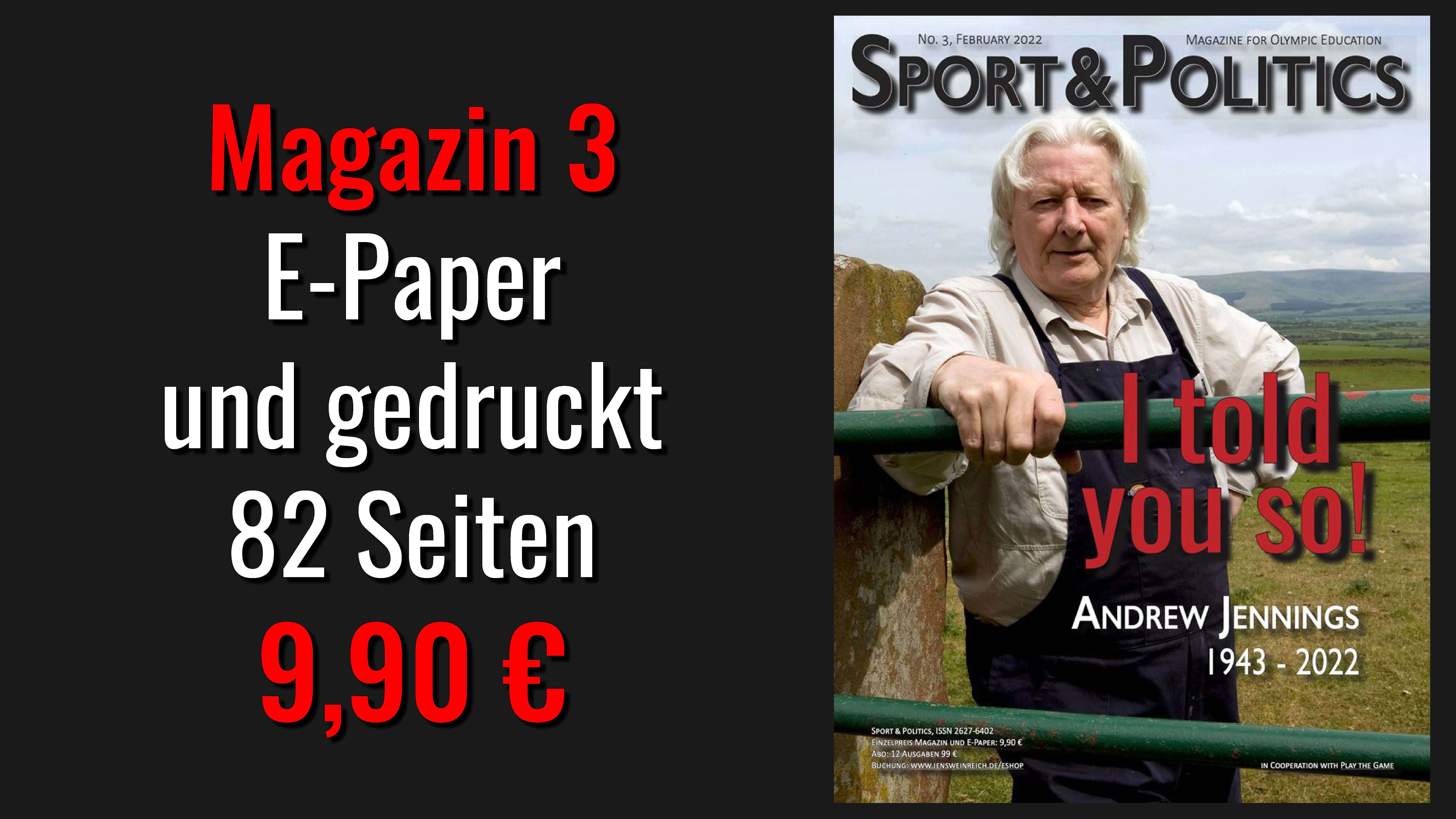
SPORT & POLITICS 3, Andrew Jennings Edition
Magazin, E-Paper und gedruckt - 11,90€ (inkl Versand)

